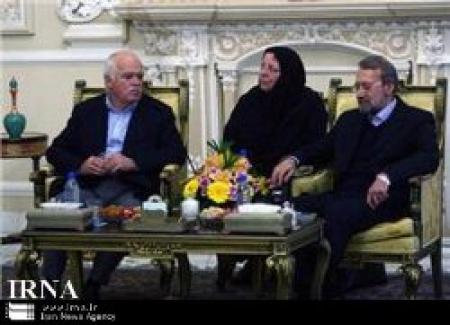ID :
146611
Tue, 10/19/2010 - 15:47
Auther :
Shortlink :
http://m.oananews.org//node/146611
The shortlink copeid
Iran's Larijani : Islam is democratic, anti-despotic by nature

Tehran, Oct 19, IRNA – Iran's Majlis Speaker Ali Larijani said here in a meeting with the Head of Bundestag Cultural Affairs Committee Peter Gauweiler that no culture should be humiliated, adding that Islam is democratic and anti-despotic by nature.
Gauweiler, who is in Tehran atop a parliamentary delegation on an invitation by his Iranian counterpart, met and conferred with Larijani on Monday evening.
Larijani, referring to the history of friendly ties between both nations, added that “the two countries’ parliaments play significant roles in harbingering proximity in various fields.”
He reiterated, “Iran and Germany have a long record of historic cooperation in various fields, particularly in cultural field, and such relations need to be preserved.”
Elaborating on the peaceful coexistence of the followers of various religions and the presence of religious minorities’ representatives in the Iranian Parliament, Larijani further stated: “The policy of the Islamic Republic of Iran is strengthening and safeguarding peaceful coexistence among the followers of various religious faiths.”
Larijani also pointed out that respecting various religions and beliefs, too, is among the fundamentals of the Islamic mentality, adding, “The authentic monotheist faiths are all of the same origin and they have many commonalties.”
Gauweiler, for his part, describing his visit of Iran of great significance, said: “This visit helped us get acquainted with the reality of affairs in the Iranian society first hand.”
Referring to the waves of negative propagations against the Islamic system in Europe he said, “We, the nations, are the victims of such media propagations.”
Considering dialog among cultures of great significance, he reiterated, “In our visit of Iran we gained a very valuable experience about peaceful coexistence of the flowers of various faiths in the Iranian society, which is unmatched throughout the entire Mideast region.”
Most Iranians are Muslims; 89% to 90% belong to the Shi'a branch of Islam, the official state religion, and about 8% belong to the Sunni branch of Islam. The remaining 2% are non-Muslim religious minorities, including Mandeans, Yarsanis, Zoroastrians, Jews, and Christians. The latter three minority religions are officially recognized and protected, and have reserved seats in the Majlis (Iranian Parliament).
Iran is also home to the largest Jewish community in Muslim World. Interestingly, Iran is the place where the Zoroastrian faith was born, and the Zoroastrian community was once the majority religion though today they number only in the tens of thousands.
(Courtesy Wikipedia for the statistics on religious minorities in Iran)/end
Gauweiler, who is in Tehran atop a parliamentary delegation on an invitation by his Iranian counterpart, met and conferred with Larijani on Monday evening.
Larijani, referring to the history of friendly ties between both nations, added that “the two countries’ parliaments play significant roles in harbingering proximity in various fields.”
He reiterated, “Iran and Germany have a long record of historic cooperation in various fields, particularly in cultural field, and such relations need to be preserved.”
Elaborating on the peaceful coexistence of the followers of various religions and the presence of religious minorities’ representatives in the Iranian Parliament, Larijani further stated: “The policy of the Islamic Republic of Iran is strengthening and safeguarding peaceful coexistence among the followers of various religious faiths.”
Larijani also pointed out that respecting various religions and beliefs, too, is among the fundamentals of the Islamic mentality, adding, “The authentic monotheist faiths are all of the same origin and they have many commonalties.”
Gauweiler, for his part, describing his visit of Iran of great significance, said: “This visit helped us get acquainted with the reality of affairs in the Iranian society first hand.”
Referring to the waves of negative propagations against the Islamic system in Europe he said, “We, the nations, are the victims of such media propagations.”
Considering dialog among cultures of great significance, he reiterated, “In our visit of Iran we gained a very valuable experience about peaceful coexistence of the flowers of various faiths in the Iranian society, which is unmatched throughout the entire Mideast region.”
Most Iranians are Muslims; 89% to 90% belong to the Shi'a branch of Islam, the official state religion, and about 8% belong to the Sunni branch of Islam. The remaining 2% are non-Muslim religious minorities, including Mandeans, Yarsanis, Zoroastrians, Jews, and Christians. The latter three minority religions are officially recognized and protected, and have reserved seats in the Majlis (Iranian Parliament).
Iran is also home to the largest Jewish community in Muslim World. Interestingly, Iran is the place where the Zoroastrian faith was born, and the Zoroastrian community was once the majority religion though today they number only in the tens of thousands.
(Courtesy Wikipedia for the statistics on religious minorities in Iran)/end





